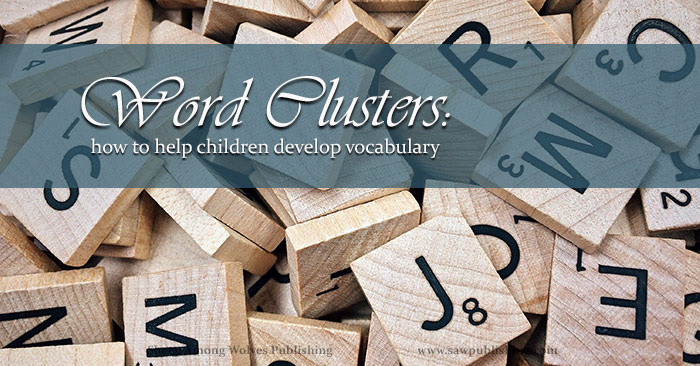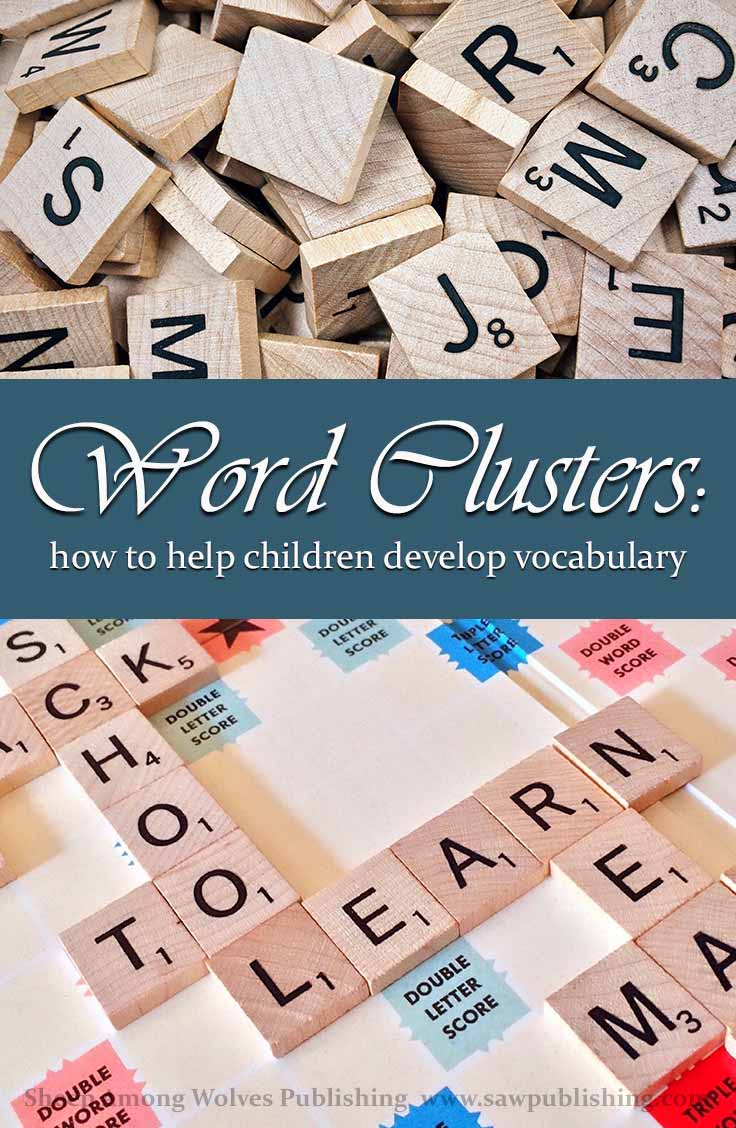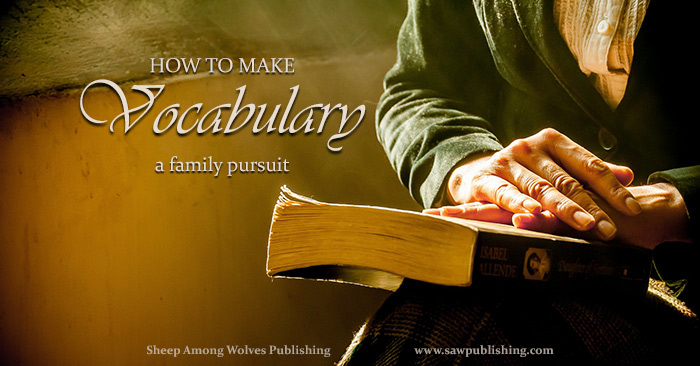Word Clusters: How to Help Children Develop Vocabulary
Timeless Tips from Educators of the Past is a companion series to our Timeless Tips from Homemakers of the Past—highlighting useful and thought provoking advice from the generations of educators who have gone before us. Our goal at Sheep Among Wolves is to provide a forum for Good and Great literature, and to help you in your quest for godly, high-quality resources. It is our hope that these Timeless Tips will be an aid and encouragement to you as you strive to follow the example of Deuteronomy 6 and diligently teach your children the words of the Lord.
 Vocabulary. Words. Meanings. Technical definitions. Have you ever wondered how to help children develop vocabulary without all the headache and grind?
Vocabulary. Words. Meanings. Technical definitions. Have you ever wondered how to help children develop vocabulary without all the headache and grind?
Have you ever wondered if there actually IS an answer for how to help children develop vocabulary in a simple, natural, and stress-free way?
Today’s Timeless Tip from Educators of the Past comes to us from 19th Century home educator Isaac Taylor—a writer we briefly featured in our previous post, Homeschooling Isn’t a New Idea. In his 1837 work, Home Education, Taylor gives us an intriguing glimpse into the way children internalize vocabulary. His theory is as simple as it is masterful, and it is just as relevant today as it was almost two hundred years ago.
As always, this Timeless Tip aims at highlighting useful principles from educators of past generations. It is not a recommendation or review of the author’s complete work.
 Are Unfamiliar Words Bad for Children?
Are Unfamiliar Words Bad for Children?
Most parents of avid readers sooner or later discover that in their voracious desire for literature, their child is in the habit of “skipping” or ignoring the meaning of words that are unfamiliar. Isaac Taylor, in a discussion of children’s poetry, addresses this topic with principles which can be applied to prose as well as verse: “Some teachers, and intelligent mothers, exhibit a needless alarm, lest, in what a child reads, or commits to memory, there should occur any words to which he attaches no meaning, or a wrong one.”
The author goes on to ask whether there is really any harm done by a child coming across a word that is unfamiliar—is it really any worse than his not knowing the thousands of terms which he has never happened to hear? As Taylor further points out:
“It does not always follow that no meaning will have been gathered from [the passage], for want of the one unknown word . . . An unknown word in a sentence is like a deep shadow in the landscape:—just on that spot the eye discriminates nothing . . .”
A single shadow does not destroy the value of the landscape—so likewise an unfamiliar word does not destroy the value of what a child reads. But Isaac Taylor’s theory goes much further than this, offering a revolutionary philosophy for how to help children develop vocabulary.
Word Clusters: Developing Vocabulary Naturally
Isaac Taylor firmly believed that unfamiliar words, introduced informally into what a child read or heard, were the secret to a natural development of vocabulary.
“The wealth and compass of a language is to be acquired, not by fingering a dictionary, or by committing definitions of words to memory; but by the gradual extension of that unconscious process, which goes on whenever words, in their true and infinitely varied connexions, are presented to the mind, and are heard, a first, a second, a third time; yet are not understood until, by little and little, a meaning, more and more precise, clusters about the sound.”
This is the way a child learns its initial vocabulary. It is the system adopted by some of the most successful adult linguistic programs. And, as Taylor believes, it is the most effective way of expanding a child’s conception of it’s mother-tongue:
“Words learned in the first instance by means of formal explanations, are found to be peculiarly liable to ambiguities of apprehension, or to be substituted one for another; and they continue to be the last words in the language that promptly and appropriately occur, when wanted in extemporaneous discourse . . . It is desirable that the wide wealth of the language should come into the mind in its natural order; that is to say, by a gradual familiarity, first with the mere sounds—not understood; and then with the meaning, by many steps of approximation.”
Difficult Words vs. Difficult Ideas
To Isaac Taylor’s mind, the selection of reading material for children—and particularly for young children—should hinge more on the simplicity of the thoughts, than on the simplicity of the vocabulary in which the thoughts are clothed:
“A monosyllabled stanza may, by presenting an adult sentiment, or an abstruse notion, pass clean over a child’s lips, without communicating one particle of its meaning . . . what to ourselves may be highly poetic, connected with the circumstances, or the manners, or the aspects of infancy, and which, when elegantly expressed, may delight us intensely, will probably be as unintelligible to a child as a chorus from Sophocles.”
Not because of the vocabulary, but because of the idea. Isaac Taylor gives an excellent example of his meaning in this following stanza:
The Crocus
Down in my solitude under the snow,
Where nothing cheering can reach me;
Here without light to see how to grow,
I’ll trust to nature to teach me.
Isaac Taylor points out that although the three-syllable, and relatively archaic word “solitude” appears at the beginning of the piece, it represents a concept that children can readily understand—and therefore forms no barrier to their understanding of the poem. On the other hand, the last two lines embody an abstract idea that is much more challenging for a child to grasp, even though it is presented in very simple vocabulary.
How to Use Word Clusters with WOW
For the last several years, SAW Publishing has been running the FREE Word of the Week (WOW) vocabulary program. This naturally raises the question: Is WOW compatible with word clusters?
Although not written with the word cluster model in mind, WOW can be quite easily adapted to embrace this vocabulary theory. By placing less emphasis on the Webster’s definitions, and more focus on the Scripture references, hymns, and narrative examples, WOW teachers can encourage students to internalize vocabulary in ways that closely parallel the natural absorption of language. Isaac Taylor’s ideas of how to help children develop vocabulary can be effectively integrated into the WOW course.
For more information on the details of the Word of the Week program, or to subscribe, see our original WOW introduction.
Word Clusters: How to Help Children Develop Vocabulary
Isaac Taylor’s vocabulary philosophy is calculated to resonate with a wide range of homeschooling parents. It focuses on a natural, intuitive approach; encourages extensive use of well-written literature; and expands education far beyond formal school hours.
If your child is struggling to internalize new words, then don’t despair. If your young reader is a hopeless “word skipper,” don’t despair either. Every exposure to unfamiliar vocabulary in a natural setting adds another particle to the cluster of ideas slowly building up around new words. With time and patience—and surprisingly little agony on the part of the student—their vocabulary will begin to expand.
And as Isaac Taylor points out, each word gained in this way is a lasting asset. Words built by clusters are words that stay in a student’s mind.
Looking for more encouragement to embrace a lifestyle of expanding vocabulary? See our previous post:

What do I do if my student hates reading? There may be no perfect recipe for getting your child to love reading. But there is a way to make sure they love great books!

Timeless Tips from Homemakers of the Past is a great place to find encouragement as a keeper at home.

Why are good and great poems so hard to find? Why do so few poets seem to value the standard of good and great work? Today’s post is a challenge to parents to prepare the next generation of faithful Christian poets.

